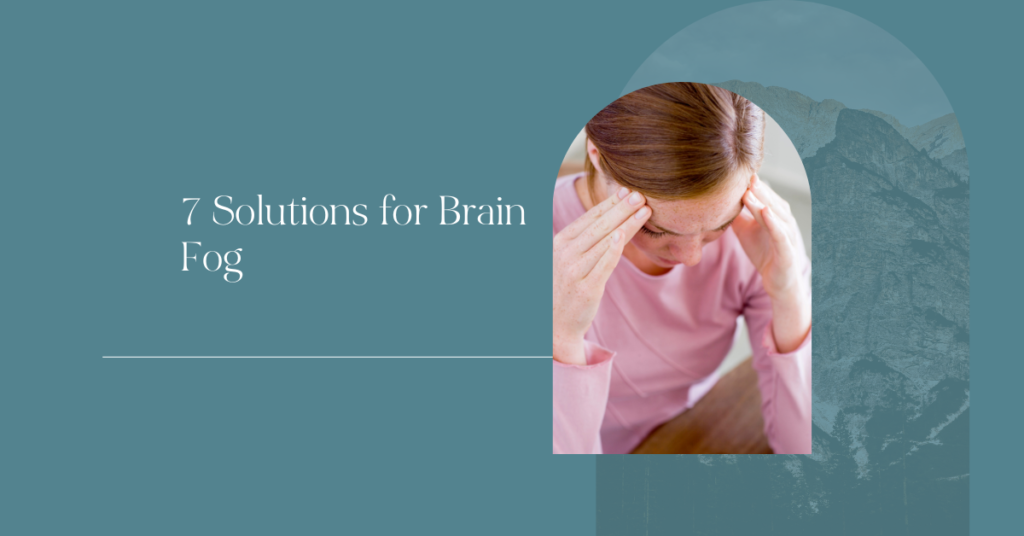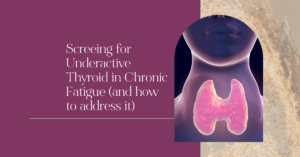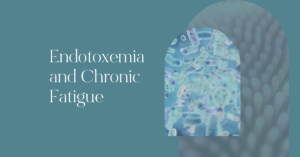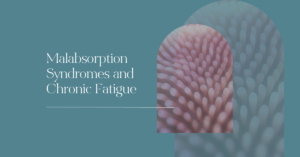Brain fog may mean different things to different people but typically it is characterised by a fuzzy head, difficulty concentrating, forgetfulness, difficulty concentrating and putting thoughts into words and feeling overwhelmed by tasks that require mental processing. It often comes hand in hand with other symptoms such as fatigue, pain or headaches.
Although brain fog is a common phenomenon, it is not normal and it is a warning sign from your body that something is out of balance. Brain fog will impact your daily experience of life, your ability to work, socialise and enjoy recreational activities like reading.
In the words of one of my favourite mentors and teachers, Dr Kharrazian, the quality of your brain health will determine the quality of your life and therefore it is definitely worth finding solutions that will reduce or even eliminate brain fog.
Here are 7 things that you can consider – you may need to address all 7 or even just 1 or 2 can make a difference. I’ve listed them in the order I would typically address them with my clients, but if your intuition is telling you something different, then you can address them in a different way, just make sure that you start!
Blood Sugar

Blood sugar highs and lows will have a dramatic effect on how you feel day to day and could be an underlying cause of brain fog. Brain fog can be the consequence of low brain energy and when blood sugar is too high, it doesn’t penetrate the brain and this impacts brain energy and clear thinking.
When blood sugar is too low, we just don’t have enough resources available and stress hormones kick in to help us out. Sometimes stress hormones can give us a boost of energy but they can also make it difficult to focus on tasks and be fully present when we socialise.
Therefore, the goal is to find glucose stability. Ideally blood glucose should fluctuate within a narrow range each day. There are many factors which can affect blood glucose, such as nutrition, exercise, digestive health, stress, sleep, toxic load and nutrient deficiencies.
The best place to start however will be to address your diet by making sure that each meal primarily consists of whole and unprocessed foods and balanced amounts of protein, healthy fats and fibrous vegetables. Aim to eat 3-4 meals per day including snacks and consume all your meals in a 12 hour window.
If you want to learn more about balancing blood sugar you can take my blood sugar mini-course which will teach you the in’s and out’s of how to stabilise and monitor your glucose levels.
Sleep
Sleep is incredibly important for how the cells in the brain, known as neurons, communicate with each other and therefore, it is important for brain health and brain function.
Sleep has many important roles for the brain and the body and in the context of brain fog sleep may promote the removal of waste products from brain cells, this includes toxins that may interfere with nerve function and damage cells.
The glymphatic system, named after the combination of the words “lymphatic” and “glia” acts to flush out the cellular trash. The glymphatic system is made up of glial cells that manage the needs of the brain. Yet the brain cannot do two things at once therefore it must either focus on sensory processing, when awake, or waste removal, when asleep. This means that sleep is essential for brain detoxification.
Finally for all cells to function properly they need the right materials in the right place at the right time. Thousands of genes have to be switched on and off in a specific order. Proteins, enzymes, fats, carbohydrates, hormones and other compounds have to be absorbed, broken down, metabolised and produced in a specific rhythm.
Energy has to be obtained, and then distributed appropriately to allow for growth, reproduction, metabolism, locomotion and cellular repair. When this network of systems is disrupted your biology becomes compromised and you feel it.
Disruption is created by the disruption of our circadian rhythms through light and dark exposure and our sleep and wake cycles. It is disruption of our natural circadian rhythm that can impact sleep, blood sugar regulation, the immune system and therefore inflammatory responses, neurology and how fast we age.
Therefore, not only do we need adequate sleep, but we also need to encourage healthy circadian rhythms of light and dark exposure to complement our sleep and wake cycles.
Stress and Nervous System Dysregulation
Stress hormones in the right amounts can encourage alertness, mental focus and productivity. However, we live in a world that very often does not deliver the perfect amount of stress and stimulation. Instead we are over-stimulated and under-restored and many of us live life in a constant state of nervous system activation.
Brain fog can often be associated with overwhelm and if you experience brain fog when you frequently feel overwhelmed by information, emotions or tasks, your body could be entering a self-protective “freeze physiology”.
The Nervous System Freeze State is a state of heightened parasympathetic activation that comes about when the autonomic nervous system becomes overstimulated by a stress or threat, real or imagined. It can result in exhaustion and fatigue, numbness, immune system suppression, digestive issues, pain and possibly even brain fog.
If you suspect that your brain fog is more of a “brain freeze” then you’ll want to be kind and gentle with yourself. You cannot rush your body or force your body out of a freeze state. Instead you want to slow down the pace of life, reduce stimulation where possible and perhaps spend some time learning more about nervous system regulation. The Nurturing Resilience Group Program is a great place to start.
Digestion

The gut is often referred to as the second brain and therefore imbalances in the digestive system can have a considerable impact on brain health and brain function.
If you experience bloating after eating, food intolerances or sensitivities, cramping, acid reflux, constipation, loose stools, diarrhoea or smelly flatulence and you feel more foggy after meals, you definitely want to consider restoring your gut health to restore your mental clarity.
That being said, even if you don’t have digestive symptoms, you can still have digestive imbalances that manifest systemically i.e. brain fog.
Digestive health is a big topic and it goes beyond the scope of this blog to dig deep. But you might like to refer to my previous blog; Is Your Gut Health Making You Tired? The link between digestion and fatigue OR the Digestive Health Mini Course is a great place to start.
Nutrient Deficiencies
Brain fog can be due to poor brain energy and ultimately the final common pathway to poor brain energy is poor production of the body’s energy currency, ATP. There are many different mechanisms by which ATP production can be affected and nutrient deficiencies are one of the many possible mechanisms.
The most common nutrient deficiencies that could be affecting brain energy are vitamin B12, folate, B1, B6 and iron (although there are many others).
Remember that we also need optimal digestive health for optimal nutrient digestion and absorption. Poor digestive function can often be associated with low levels of B-vitamins and vegan or vegetarian diets. Women with heavy periods or who have experienced recent blood loss or intestinal parasites may be more susceptible to low iron.
Inflammation
We all know how it feels to have an acute bout of the flu; fatigued, achy, brain foggy, low in motivation and even small tasks can be exhausting. These symptoms are not the flu virus per se, but rather the consequence of energy being prioritised towards the immune system to help the body manage the threat of the invading pathogen.
Yet, even when your body is not fighting an infection, it may still be susceptible to chronic low grade inflammation due to chronic stress, digestive imbalances, nutrient deficiencies, blood sugar imbalances, a sedentary lifestyle and poor dietary choices.
The solution is to address all of the above and work on creating an anti-inflammatory lifestyle.
Here are some things you could consider:
- Focus on a diversity of plant-based foods in your diet.
- Focus on high quality proteins and good quality fats like avocado, olive oil, coconut products, flaxseed, chia seed, hempseed, pumpkin seeds, walnuts and almonds.
- Consume oily fish if it sits within your ethical preferences or consume an omega 3 supplement from algae. DHA is more appropriate for brain health specifically and EPA is more supportive for immune function and inflammation.
- As you increase the goodness in your diet you can reduce and if appropriate, eliminate common inflammatory foods from your diet such as gluten, dairy, refined sugar, processed carbohydrates, alcohol, food additives, sweeteners and preservatives
- Use blood sugar monitoring to bring blood sugar into balance.
- Add in supplements and foods with known anti-inflammatory benefits such as curcumin, boswellia, bromelain, green tea, cayenne pepper and probiotics.
- Manage stress and practise nervous system self care
Toxins
Toxins are a source of threat to every cell in the body and when the total body burden of toxins becomes too high, the function of the cell suffers and this could be an underlying cause of your foggy brain.
The unfortunate truth is that toxins are everywhere are include:
- Heavy Metals
- Biotoxins produced from bacteria, mold and yeast e.g. mycotoxins and endotoxins
- Plastics
- Environmental pollutants
- Personal care and home cleaning products
- Pesticides on fruit and vegetables
One of the many consequences of a body overloaded with toxins is poor energy production resulting in symptoms such as brain fog, fatigue and pain. Actively avoiding toxins and supporting their clearance from the body is essential to recovery cell function, energy production and health.
The Detoxification and Drainage Mini Course is a great place to start.
What Next?
By now you hopefully understand several of the mechanisms which may be behind your brain fog and there is plenty that you can be doing to support your body and your brain!
However, I know it can also be overwhelming when you don’t know where to start. Remember that I have several Mini Courses Available that can help you tackle your brain fog one step at a time. You may also want to consider some 1:1 support and you can find out more here.

